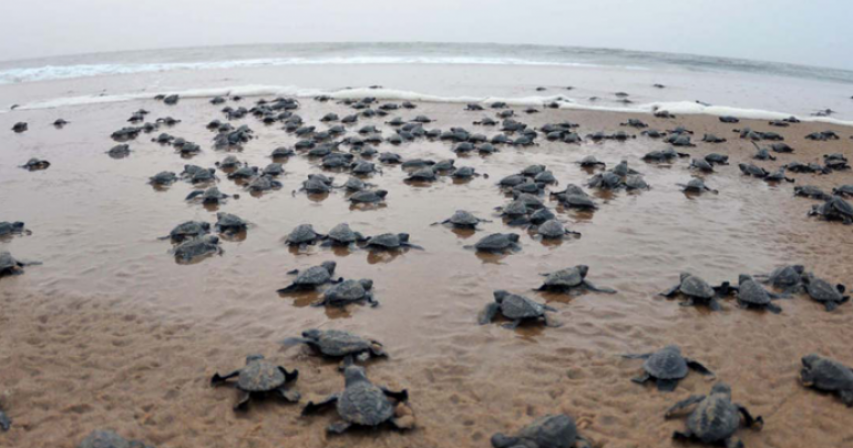QU's Environmental Science Center Begins Annual Season to Monitor Rare Sea Turtle Nesting
- 3 years ago

The Environmental Science Center at Qatar University (QU) started the annual season to monitor the nesting of rare and endangered sea turtles for the 2021 season on the coasts and islands of Qatar, implemented in cooperation with the Ministry of Municipality and Environment funded by Qatar Petroleum, within the framework of the marine turtle protection project launched 19 years ago.
The sea turtle nesting season usually begins on April 1 of each year, when turtles begin to lay their eggs on the northern shores of the State of Qatar, which is estimated between 75 to 100 eggs per shed.
Sea turtles represent one of the components of the rich ecosystem of the State of Qatar, and are an important partner in the ecological balance that harmonizes the requirements of urban and industrial development and the protection and maintenance of the environment, in addition to supporting biodiversity in such marine and coastal environments.
QU's Environmental Science Center said that the eggs are collected after the dumping process is completed and transferred either to Fuwairit or Ras Laffan reserves, while the eggs are left in their natural nests on Qatari islands such as Umm Tais Island, Ras Rakan Island, Shrao's Island and Halul Island, where the number of visitors to these islands is less compared to the coastal beaches.
The Center indicated that, over the past 19 years, they carried out many studies related to turtles and their nesting areas in the form of annual reports or scientific research published in annual international scientific books. Recently, the Center carried out a study related to hawksbill turtles and the effect of climate change, especially the rise in temperatures on the processes of hatching and gender since the high temperature of the nests leads, for example, to an increase in the number of males and a decrease in the number of females.
The Center also carried out a study to track turtles in the territorial waters of the State of Qatar and the Gulf, which consists in placing tracking devices to know their areas of concentration and feeding until they return again in other seasons to the Qatari beaches.
These studies are part of the turtle care and protection project, the Center confirmed, which helps to strengthen the ecosystem and create a kind of balance between urban and industrial development and the protection and maintenance of the environment, in addition to supporting biodiversity in such marine and coastal environments.
Director of the Environmental Science Center at QU Dr. Hamad Al Saad Al Kuwari said that QU, represented by the Center, is proud of its long experience in protecting the marine environment, and turtles are part of it. This is reflected in its own data bank, he noted, in addition to the long experience of scientific and technical researchers that have been acquired over the past two decades, indicating that interest is increasing daily by the Center regarding the dangers that turtles face in the Gulf and the world.
He added that although at the present time it is not fully understood the roles that sea turtles played in past centuries in the ecological balance, one of the Center's primary tasks is to closely follow these turtles and collect more information and data related to them.
Dr. Al Kuwari explained that the in-depth study of turtles provides a better understanding of these roles by identifying the structure and functions that have been lost in marine ecosystems, the environmental impacts of their remaining groups and their role in the ecosystem, as well as following up on the importance of management, protection and periodic control measures required to reach the levels that preserve their viability and what are the improvements in the health of the ecosystem that could contribute to the restoration of marine turtle populations.
Dr. Al Kuwari pointed out that the information currently available indicates that sea turtles play an important role in the marine ecosystem. He referred to green turtles as am example. who have an important role in the ecological balance through their exploitation of seaweeds as food, and hawksbill turtles have an important role in coral reefs by feeding them on some invertebrate organisms in these reefs. This preserves the ecological balance of other wildlife and helps to achieve a balance between food networks or chains and facilitate the natural nutrient cycle in the marine environment, even the shells of turtle eggs after the hatching season is one of the most important natural nutrients for the soil, he underlined.
He indicated that turtles have an important role in providing suitable housing for the diverse marine organisms in the seagrass and coral reef environment, pointing out that in-depth and continuous studies will reveal many of the roles of turtles in protecting the environment and maintaining the ecological balance.
(QNA)
Comments